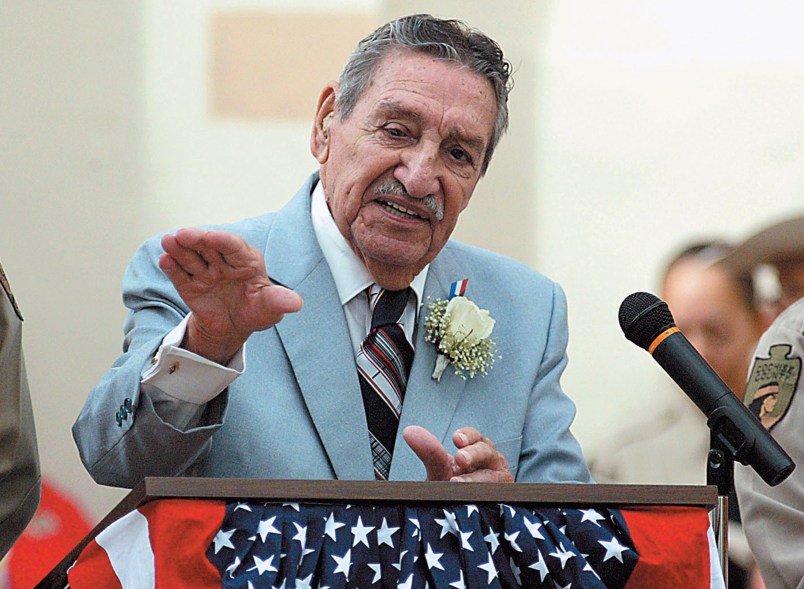PHOENIX (AP) — Raul Hector Castro, Arizona’s only Hispanic governor and an American ambassador to three countries, died Friday. He was 98.
Family spokesman James Garcia said Castro died in his sleep in San Diego, where he was in hospice care.
Castro was a self-made man, the embodiment of the American dream. He overcame poverty and discrimination to graduate from college and launch a successful career in politics and diplomacy.
“America is the land of opportunity,” Castro told The Associated Press in 2010. “Here, one can accomplish whatever they want to be. But you’ve got to work for it.”
Growing up on the U.S.-Mexico border near Douglas, Arizona, Castro saw discrimination around him. He said he wondered why the Hispanics were laborers and none delivered the mail or worked in offices.
It didn’t seem right that the Hispanic children had to walk miles to school every day while the white kids would wave from a passing school bus, he said.
He set out to beat the odds. When he couldn’t get a job as a teacher — schools didn’t hire educators of Mexican descent back then — he became a drifter for a while, working as a farm hand and boxing here and there.
He landed a job with the U.S. Consulate in the border city of Agua Prieta, Mexico. After five years, a senior official told him he was doing a great job but had no future in the foreign service — he had a Hispanic name and no Ivy League education. Castro quit and moved to Tucson.
A law school dean at the University of Arizona told Castro he wouldn’t be accepted because Castro couldn’t afford to quit a job teaching Spanish. Besides, the dean said, Hispanic students didn’t do well in law school.
Undeterred, Castro went to the university president, who convinced the dean to give Castro an opportunity to prove himself. He excelled and went on to be elected the first Hispanic county attorney and later the first Hispanic judge in Pima County Superior Court.
“One of the finest men I ever knew,” former Gov. Rose Mofford, a fellow Democrat, said of Castro during a 2010 interview with the AP.
Born in Cananea, Mexico, in 1916, some 50 miles south of Arizona, Castro grew up in Arizona and graduated from Douglas High School. He was the second-youngest in a family with 12 children — 11 boys and one girl. His father was a union leader forced out of Mexico for organizing a strike at the mine in Cananea.
His father died when Castro was 12, and his mother became a midwife to feed the family. She delivered babies for the Mexican families around Douglas in exchange for flower, corn, beans and other staples.
Education was the best way out, Castro determined.
He went on to serve as U.S. ambassador to three Latin American countries under three U.S. presidents. Lyndon Johnson sent him to El Salvador, where Castro became known as “Yankee Castro” to differentiate him from the other Raul Castro — the brother of Cuban dictator Fidel Castro.
Johnson later sent him to Bolivia, and he stayed for a short time under Richard Nixon before returning to Arizonaand making the first of two bids for governor.
His statewide races were two of the closest gubernatorial elections in state history. He lost to Republican Jack Williams in 1970 by 1.5 percentage points.
He fared better four years later as the Republican Party was embroiled in the Watergate corruption scandal. Castrodefeated Republican Russ Williams by less than 1 percentage point three months after Nixon resigned in controversy.
As an ambassador and judge, Castro was used to having unquestioned authority; he struggled to adjust to the checks and balances imposed on a governor, said Alfredo Gutierrez, a Democrat and legislative leader while Castrowas governor.
“It was a very difficult beginning for him,” Gutierrez said. “It was quite an adjustment.”
Castro was governor for 2½ years before resigning when President Jimmy Carter appointed him ambassador to Argentina.
He told the AP he was proud of his work motivating Hispanics to vote, many of them for the first time despite deep nerves.
“The thing that bothered me the most when I resigned as governor, the Hispanic community felt that I had betrayed them, because they worked so hard to get me elected,” he reminisced decades later. “I had to convince them and persuade them that being an American ambassador was just as important as being a governor. I had more authority.”
Castro spent his waning years living in Nogales and talking to students around the state, motivating them to work hard and chase lofty dreams.
Copyright 2015 The Associated Press. All rights reserved. This material may not be published, broadcast, rewritten or redistributed.







A Chicano political pioneer, whose story still inspires. R.I.P.